In the early seventies, while the Southern Pacific Railway was building from San Francisco to
San José, some twelve or fifteen bandits, carousing at a country dance in the Mexican settlement, Panamá (about six miles south of Bakersfield) planned to cross the mountains and hold up the pay-car. They were unsuccessful; whereupon, they turned their attention to the village of Tres Pinos, robbed several store-keepers and killed three or four men. They were next heard of at little Kingston, in Tulare County, where they plundered practically the whole town. Then they once more disappeared.
Presently various clues pointed to the identity of the chief bandido as one Tibúrcio Vasquez, born in Monterey in the thirties, who had taken to the life of an outlaw because, as he fantastically said, some Gringos had insolently danced off with the prettiest girls at fandangos, among them being his sweetheart whom an American had wronged. With the exception of his Lieutenant, Chavez, he trusted no one, and when he moved from place to place, Chavez alone accompanied him. In each new field he recruited a new gang, and he never slept in camp with his followers.
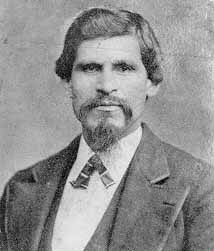
Although trailed by several sheriffs, Vasquez escaped to Southern California leading off the wife of one of his associates—a bit of gallantry that contributed to his undoing, as the irate husband at once gave the officers much information concerning Vasquez’s life and methods. One day in the spring of 1874, Vasquez and three of his companions appeared at the ranch of Alessandro Repetto, nine miles from town, disguised as sheep-shearers. The following morning, while the inmates of the ranch-house were at breakfast, the highwaymen entered the room and held up the defenseless household. Vasquez informed Repetto that he was organizing a revolution in Lower California and merely desired to borrow the trifling sum of eight hundred dollars. Repetto replied that he had no money in the house; but Vasquez compelled the old man to sign a check for the sum demanded, and immediately dispatched to town a boy working for Repetto, with the strict injunction that if he did not return with the money alone, and soon, his master would be shot.
When the check was presented at the Temple & Workman Bank, Temple, who happened to be there, became suspicious but could elicit from the messenger no satisfactory response to his questions. The bank was but a block from the Courthouse; and when Sheriff Rowland hurriedly came, in answer to a summons, he was inclined to detain the lad. The boy, however, pleaded so hard for Repetto’s life that the Sheriff agreed to the messenger’s returning alone with the money.
Soon after, Rowland and several deputies started out along the same trail; but a lookout sighted
the approaching horsemen and gave the alarm. Vasquez and his associates took to flight and were pursued as far as Tijunga Pass; but as the cut-throats were mounted on fresh horses, they escaped.
Even while being pursued, Vasquez had the audacity to fleece a party of men in the employ of
the Los Angeles Water Company who were doing some work near the Alhambra Tract. The well known Angeleño and engineer in charge, Charles E. Miles, was relieved of an expensive gold
watch.
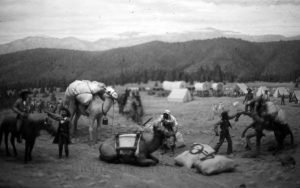
In April, 1874, Sheriff Rowland heard that Vasquez had visited the home of “Greek George”— the Smyrniot camel-driver to whom I have referred—and who was living about ten miles from Los Angeles, near the present location of Hollywood. Rowland took into his confidence D. K. Smith and persuaded him to stroll that way, ostensibly as a farmer’s hand seeking employment; and within two weeks Smith reported to Rowland that the information as to Vasquez’s whereabouts was correct. Rowland then concluded to make up a posse, but inasmuch as a certain clement kept Vasquez posted regarding the Sheriff’s movements, Rowland had to use great precaution.
Anticipating this emergency, City Detective Emil Harris-four years later Chief of Police-had been
quietly transferred to the Sheriff’s office; in addition to whom, Rowland selected Albert Johnson, Under Sheriff; B. F. Hartley, a local policeman; J. S. Bryant, City Constable; Major Henry M. Mitchell, an attorney; D. K. Smith; Walter Rodgers, proprietor of the Palace Saloon; and G. A. Beers, a correspondent of the San Francisco Chronicle. All these were ordered to report, one by one with their horses, shortly after midnight, at Jones’s Corral on Spring Street near Seventh. Arms and ammunition, carefully packed, were likewise smuggled in. Whether true or not that Vasquez would speedily be informed of the Sheriff’s whereabouts, it is certain that, in resolving not to leave his office, Rowland sacrificed, for the public weal, such natural ambition that he cannot be too much applauded; not even the later reward of eight thousand dollars really compensating him for his disappointment.
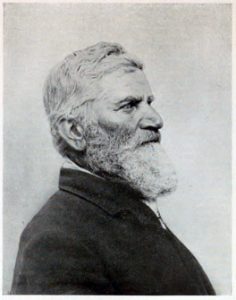
By half-past one o’clock in the morning, the eight members of the posse were all in the saddle and silently following a circuitous route. At about daybreak, in dense fog, they camped at the mouth of Nichols’s Canyon-two miles away from the house of Greek George-where Charles Knowles, an American, was living. When the fog lifted, Johnston, Mitchell, Smith and Bryant worked their way to a point whence they could observe Greek George’s farm; and Bryant, returning to camp, reported that a couple of gray horses had been seen tied near the ranch-house. Shortly thereafter, a four horse empty wagon, driven by two Mexicans, went by the cañon and was immediately stopped and brought in. The Mexicans were put in charge of an officer, and about the same time Johnston came tearing down the ravine with the startling statement that Vasquez was undoubtedly at Greek George’s!
A quick consultation ensued and it was decided by the posse to approach their goal in the captured vehicle, leaving their own horses in charge of Knowles; and having warned the Mexicans that they would be shot if they proved treacherous, the deputies climbed into the wagon and lay down out of sight. When a hundred yards from the house, the officers stealthily scattered in various directions.
Harris, Rodgers and Johnston ran to the north side, and Hartley and Beers to the west. Through
an open door, Vasquez was seen at the breakfast table, and Harris, followed by the others, made a quick dash for the house. A woman waiting on Vasquez attempted to shut the officers out; but Harris injected his rifle through the half-open door and prevented her. During the excitement, Vasquez climbed through a little window, and Harris, yelling, “There he goes!” raised his Henry rifle and shot at him. By the time Harris had reached the other side of the house, Vasquez was a hundred feet away and running like a deer toward his horse. In the meantime, first Hartley and then the other officers used their shotguns and slightly wounded him again. Vasquez then threw up his hands, saying: “Boys, you’ve done well! but I’ve been a damned fool, and it’s my own fault!”
The identity of the bandit thus far had not been established; and when Harris asked his name, he answered, “Alessandro Martinez.” In the meantime, captors and prisoner entered the house; and Vasquez, who was weakened from his wounds, sat down, while the young woman implored the officers not to kill him. At closer range, a good view was obtained of the man who had so long terrorized the State. He was about five feet six or seven inches in height, sparely built, with small feet and hands-in that respect by no means suggesting the desperado-with a low forehead, black, coarse hair and mustache, and furtive, cunning eyes.
Not the Spanish Alejandro; a variation doubtless suggested by the Italian Repetto’s forename.
By this time, the entire posse, excepting Mitchell and Smith (who had followed a man seen to leave Greek George’s), proceeded to search the house. The first door opened revealed a young fellow holding a baby in his arms. He, the most youthful member of the organization, had been placed on guard. There were no other men in the house, although four rifles and six pistols, all loaded and ready for use, were found. Fearing no such raid, the other outlaws were afield in the neighborhood; and being warned by the firing, they escaped. One of Vasquez’s guns, by the way, has been long preserved by the family of Francisco Ybarra and now rests secure in the County Museum.
Underneath one of the beds was found Vasquez’s vest containing Charley Miles’s gold watch, which Harris at once recognized. The prisoner was asked whether he was seriously hurt and he said that he expected to die, at the same time admitting that he was Vasquez and asking Harris to write down some of his bequests. He said that he was a single man, although he had two children living at Elizabeth Lake; and he exhibited portraits of them. He protested that he had never killed a human being, and said that the murders at Tres Pinos were due to Chavez’s disobedience of orders.
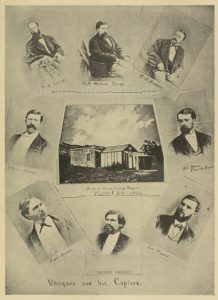
The officers borrowed a wagon from Judge Thompson—who lived in the neighborhood—into which they loaded Vasquez, the boy and the weapons, and so proceeded on their way. When they arrived near town, Smith and Mitchell caught up with them. Mitchell was then sent to give advance notice of Vasquez’s capture and to have medical help on hand; and by the time the party arrived, the excitement was intense. The City Fathers, then in session, rushed out pellmell and crowds surrounded the Jail. Dr. K. D. Wise, Health Officer, and Dr. J. P. Widney, County Physician,administered treatment to the captive. Vasquez, in irons, pleaded that he was dying; but Dr. Widney, as soon as he had examined the captive, warned the Sheriff that the prisoner, if he escaped, would still be game for a long day’s ride. Everybody who could, visited him and I was no exception. I was disgusted, however, when I found Vasquez’s cell filled with flowers, sent by some white women of Los Angeles who had been carried away by the picturesque career of the bandido; but Sheriff Rowland soon stopped all such foolish exuberance.
Vasquez admitted that he had frequently visited Mexicans in Los Angeles, doing this against the
advice of his lieutenant, Chavez, who had warned him that Sheriff Rowland also had good friends among the Mexicans.
Among those said to have been in confidential touch with Vasquez was Mariano G. Santa Cruz, a prominent figure, in his way, in Sonora Town. He kept a grocery about three hundred feet from the old Plaza Church, on the east side of Upper Main Street, and had a curiously-assorted household. There on many occasions, it is declared, Vasquez found a safe refuge.
Five days after the capture, Signor Repetto called upon the prisoner, who was in chains, and
remarked: “I have come to say that, so far as I am concerned, you can settle that little account with God Almighty!” Vasquez, with characteristic flourishes, thanked the Italian and began to speak of repayment, when Repetto replied: “I do not expect that. But I beg of you, if ever you resume operations, never to visit me again.” Whereupon Vasquez, placing his hand dramatically upon his breast, exclaimed: “Ah, Señor, I am a cavalier, with a cavalier’s heart!”—¡Señor Repetto, yo soy un caballero, con el corazón de un caballero!
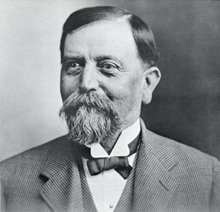
As soon as Vasquez’s wounds were healed, he was taken by Sheriff Rowland to Tres Pinos and there indicted for murder. Miller & Lux, the great cattle owners, furnished the money, it was understood, for his defense—supposedly as a matter of policy. His attorneys asked for, and obtained, a change of venue, and Vasquez was removed to San José. There he was promptly tried, found guilty and, in March, 1875, hanged.
Many good anecdotes were long told of Vasquez; one of which was that he could size up a man quickly, as to whether he was a native son or not, by the direction in which he would roll a cigarette—toward or away from himself! As soon as the long-feared bandit was in captivity, local wits began to joke at his expense. A burlesque on Vasquez was staged late in May at the Merced Theater; and the day the outlaw was captured, a merchant began his advertisement: VASQUEZ says that MENDEL MEYER has the Finest and Most Complete Stock of Dry Goods and Clothing, etc.”
from: Sixty years in Southern California, 1853-1913, containing the reminiscences of Harris Newmark. Edited by Maurice H. Newmark; Marco R. Newmark
also see: